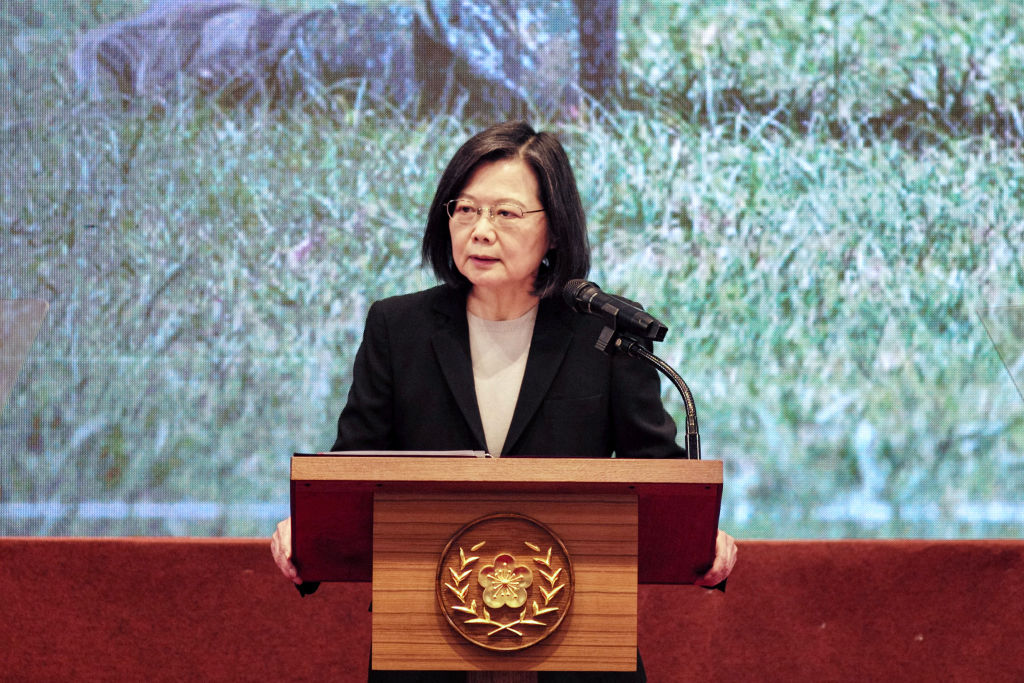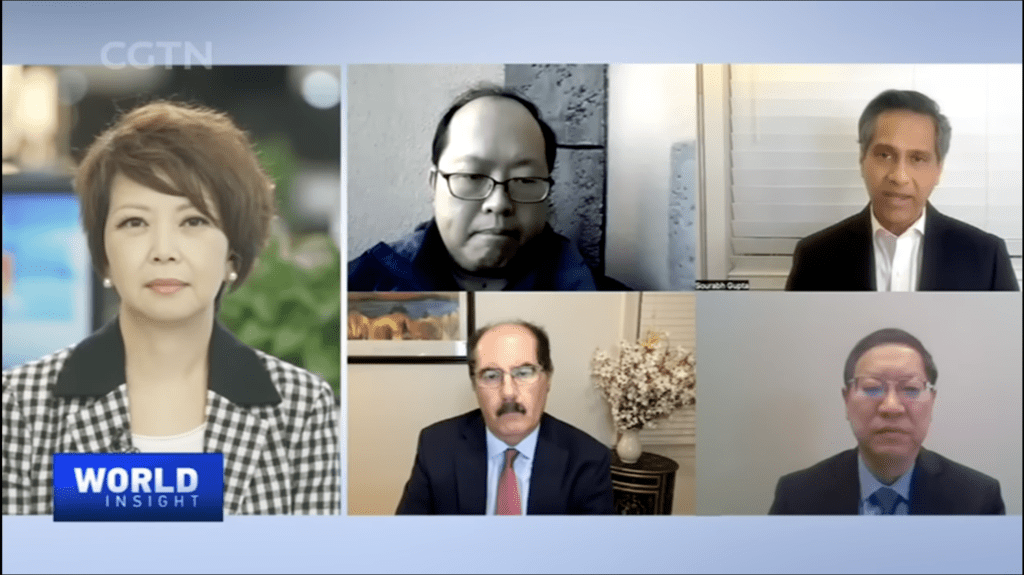
ICAS Bulletin (online ISSN 2836-3418, print ISSN 2836-340X) is published every other week throughout the year at 1919 M St NW, Suite 310, Washington, DC 20036.
The online version of ICAS Bulletin can be found at chinaus-icas.org/bulletins/.

– The U.S. State Department has approved the sale of a mine-laying system to Taiwan citing China’s increasingly aggressive rhetoric and recent military exercises around the island.
– Indonesia, Malaysia, Singapore, Vietnam, Myanmar, Thailand, and the Philippines have expanded their submarine arsenals as geopolitical rivalries rise between the U.S. and China.
– Following President Biden’s expansion of American material support for Taiwan via the new National Defense Authorization Act, China sent at least 71 Chinese aircraft near Taiwanese airspace, setting a record for Chinese military aircraft in the airspace.
– According to the South China Sea Strategic Situation Probing Initiative, the U.S. sent 589 large warplanes from January to November to gather intelligence around the South China Sea.
– The Taiwan Foreign Ministry hailed the new U.S. National Defense Authorization Act as “showing the great importance it attaches to Taiwan-U.S. relations.” In contrast, the Chinese Foreign Ministry stated that it “severely affects peace and stability across the Taiwan Strait.”
– In retaliation for Washington’s actions over alleged Chinese human rights abuses in Tibet, China authorized sanctions on two U.S. citizens, Todd Stein and Miles Yu Maochun, freezing their Chinese assets and barring them from entering the country.
– Chinese Foreign Minister Wang Yi told U.S. Secretary of State Antony Blinken that the U.S. must not suppress Chinese development and should not continue the “old routine of unilateral bullying.”
– The Japanese government has drastically increased defense spending, including US$1.6 billion to purchase U.S.-made Tomahawk missiles, which will be a part of Japan’s most extensive military build-up since World War II.
Associated News References:
“US to Sell Taiwan Anti-Tank System Amid Rising China Threat,” Voice of America, December 29
“Southeast Asia nations boosting submarine orders amid US-China rivalry,” South China Morning Post, December 28 [Paywall]
“With Record Military Incursions, China Warns Taiwan and the U.S.,” The New York Times, December 26 [Paywall]
“US spy planes edge closer to China’s shores in 2022: think tank,” South China Morning Post, December 25 [Paywall]
“China blasts US defense bill while Taiwan welcomes it,” Associated Press, December 24
“China sanctions 2 US citizens over action on Tibet,” Associated Press, December 23
“U.S. must stop ‘bullying’, suppressing China’s development, foreign minister says,” Reuters, December 23 [Paywall]
“Japan to hike annual defence budget by a quarter to buy Tomahawks and other weapons,” Reuters, December 23 [Paywall]

– After an increase in U.S. cooperation with Taiwan Semiconductor Manufacturing Company, China plans to revamp the Chinese semiconductor strategy, focusing on “enhancing strengths instead of fixing weaknesses.”
– Meta CEO Mark Zuckerberg has voiced concern about Chinese theft of American technologies and now looks to move Meta’s tech supply chain out of China.
– TSMC has responded to concerns that the US$60.4 billion investment in U.S. semiconductor manufacturing weakens Taiwan’s strategic interests in manufacturing by showing that U.S. investments are one-third of TSMC’s Taiwanese investments.
– Despite severe setbacks due to Covid-19 outbreaks at Foxconn’s manufacturing plant in Zhengzhou, Apple is set to catch up to demands for their iPhone product as most Covid-control measures in China have been lifted.
– Huawei has published its third quarter of consistent growth, despite strong U.S. curbs and restrictions in 2022, emphasizing a return to normal to investors.
– Biden administration officials are pushing for buyouts of Chinese-owned tech and social media companies, such as TikTok, by U.S. firms to eliminate risks of espionage and political influence.
– TikTok’s parent company, ByteDance, has fired four employees following an investigation that showed they had accessed private data on U.S. journalists and other users, further concerning the Biden administration on TikTok’s privacy.
– Chinese tech firm Tencent plans to join RISC-V International, the most prominent open-source processor architecture group, despite growing U.S. export curbs on semiconductors.
Associated News References:
“China to revamp chip strategy under US pressure, but US$143 billion support package is not on the cards,” South China Morning Post, December 30 [Paywall]
“Made-in-China labels become a problem for Meta’s anti-China stance,” The Washington Post, December 31 [Paywall]
“TSMC reaffirms ‘commitment to Taiwan’ despite U.S. chip push,” Nikkei Asia, December 29
“Apple iPhone Output in China Begins to Catch Up Despite Covid-19 Issues,” The Wall Street Journal, December 29 [Paywall]
“Huawei Declares ‘Business as Usual’ After Weathering US Curbs,” Bloomberg, December 29 [Paywall]
“TikTok Security Dilemma Revives Push for U.S. Control,” The Wall Street Journal, December 26 [Paywall]
“TikTok admits using its app to spy on reporters in effort to track leaks,” The Guardian, December 23
“ByteDance Inquiry Finds Employees Obtained User Data of 2 Journalists,” The New York Times, December 22 [Paywall]
“Tencent joins open-source chip design community RISC-V as China seeks to mitigate impact from US sanctions,” South China Morning Post, December 22 [Paywall]

– The Chinese government has appointed Qin Gang, the current Chinese Ambassador to the U.S., as the new Chinese foreign minister, replacing previous foreign minister Wang Yi. New Foreign Minister Gang looks to, “make due efforts for the well-being of the two peoples and for world peace.”
– Taiwan has extended mandatory military service for male citizens to a full year in response to increasing worries about a Chinese military threat in Taiwan.
– The former Chinese foreign minister Wang Yi signaled Chinese impartiality on the Russian-Ukrainian war and signaled that China is looking to deepen political ties with Russia.
– The former Chinese foreign minister Wang Yi looks to “recalibrate” the Chinese relationship with U.S. and European nations, looking to improve bilateral relations.
– Following the passage of the Omnibus Consolidated Appropriations Act, which covered funding for the U.S. government in 2023, allowing up to US$2 billion in loans to Taiwan, despite a previous effort towards grants to Taiwan in U.S. legislation.
– China’s deputy permanent representative to the United Nations called for the U.S. to lift sanctions on Iran and revive negotiations on the 2015 nuclear deal.
Associated News References:
“New Chinese Foreign Minister Qin Gang vows to prioritise US ties, tweets praise for Americans,” South China Morning Post, January 3 [Paywall]
“China names its envoy to US Qin Gang as new foreign minister,” AlJazeera, December 30
“Taiwan to Extend Mandatory Military Service in Face of Chinese Pressure,” The Wall Street Journal, December 27 [Paywall]
“China’s foreign minister signals deeper ties with Russia,” Associated Press, December 25 [Paywall]
“China Aims to Rebuild US Ties in Diplomatic Push for 2023,” Bloomberg, December 25 [Paywall]
“US bill authorizes arms loans, not grants,” Taipei Times, December 22
“China calls on US to lift Iran sanctions to revive nuclear talks,” South China Morning Post, December 20 [Paywall]

– Analysts from Goldman Sachs have concluded that the rapid Chinese reopening will lead to short-term difficulties but will likely lead to improved economic growth in 2023.
– Concurrent with the U.S. effort to decouple global supply chains’ dependence on Chinese manufacturing, China seeks to increase trade with its Asian neighbors. Southeast Asia’s total trade with China has increased 71% since 2018.
– Amid rising Covid-19 cases in Shanghai, Tesla has suspended production at its Shanghai plant, heavily disrupting Tesla manufacturing.
– The World Trade Organization has ruled in favor of Hong Kong in a dispute regarding U.S. demands that goods manufactured in Hong Kong be labeled “Made in China.”
– The Chinese Xinjiang region saw a 64% decrease in exports to the U.S. following strict U.S. import curbs that went into effect under the Uygur Forced Labour Prevention Act.
– The Hong Kong Secretary for Commerce and Economic Development, Algernon Yau, has condemned the U.S. rejection of the World Trade Organization’s ruling that Hong Kong goods should not be labeled “Made in China.”
Associated News References:
“China reopening earlier than expected could hit supply chains in the short term, but boost growth in 2023,” CNBC, December 29
“China Increases Trade in Asia as U.S. Pushes Toward Decoupling,” The Wall Street Journal, December 28 [Paywall]
“Tesla suspends production at Shanghai plant,” Reuters, December 24 [Paywall]
“WTO rules against US in Hong Kong labelling dispute,” AlJazeera, December 22
“US-bound exports from China’s Xinjiang drop 64 per cent, monthly trade data shows,” South China Morning Post, December 21 [Paywall]
“Hong Kong officials, exporters urge US to respect WTO ruling on not needing ‘Made in China’ label for city goods,” South China Morning Post, December 21 [Paywall]

– The Biden administration will require all travelers from China, Hong Kong, and Macau to obtain negative Covid-19 results before entering the U.S. The requirement comes amid concern expressed by the Center for Disease Control over China’s “lack of transparency” in Covid-19 reporting. The policy garnered a “muted” response from Chinese newspapers.
– The U.S. Secretary of State Antony Blinken called upon the Chinese government to increase transparency around Covid-19 cases, following the Chinese National Health Commissions’ decision to no longer publish daily Covid-19 infection reports.
– Worsening U.S.-Chinese relations stymied bilateral collaboration to combat the production of Chinese-sourced fentanyl. While U.S. Ambassador to China Nicholas Burns is looking to re-engage on fentanyl, a spokesman for China’s embassy in Washington has claimed that the U.S. is responsible for the failure of collaboration.
– South Dakota Governor Kristi Noem concluded that the state’s investment portfolio had no direct investments in China but has stakes in emerging market funds that invest in China. The investigation comes as the U.S. looks to decouple funds from the Chinese Communist Party.
Associated News References:
“China Responds to U.S. Covid Testing Rule With a Collective Shrug,” The New York Times, December 29 [Paywall]
“U.S. to Require Negative Covid Tests for Travelers Coming From China,” The New York Times, December 28 [Paywall]
“China has stopped publishing daily COVID data amid reports of a huge spike in cases,” NPR News, December 25
“US urges China to be transparent about growing Covid outbreak,” Financial Times, December 23 [Paywall]
“Sour U.S.-China Relations Feed the Fentanyl Crisis,” The Wall Street Journal, December 22 [Paywall]
“Gov. Noem: Investment review finds limited funds in China,” Associated Press, December 21
“U.S. Champions of High-Speed Trains Find Adoring Fans—7,000 Miles Away,” The Wall Street Journal, December 28 [Paywall]
“China to import 45 foreign video games, grants multiple licenses to Tencent,” CNBC, December 28
“Australia approves extradition request for former U.S. Marines pilot over China military training,” Reuters, December 28 [Paywall]
“American Bargain Hunters Flock to a New Online Platform Forged in China,” The Wall Street Journal, December 24 [Paywall]
“Tesla sends Shanghai boss and aides to jumpstart U.S. output,” Reuters, December 23 [Paywall]
“Memphis Zoo pandas Ya Ya, Le Le to return to China,” Associated Press, December 22
“BioNTech ships COVID shots to China for use by Germans,” Reuters, December 22 [Paywall]
“China Accused of Fresh Territorial Grab in South China Sea,” Bloomberg, December 20 [Paywall]
December 15 hosted by Foreign Policy
December 14 hosted by China Research Center
December 12 hosted by Wilson Center
December 8 by The International Institute for Strategic Studies
January 12 hosted by Asia Society
January 16 hosted by University of California Berkeley
January 9 hosted by Center for Strategic And International Studies
January 10 hosted by Brookings
By Amanda Jin
December 28, 2022
As an increasing number of research projects and reports are underlining the need to contain global warming within 1.5 degree Celsius, it is ever more important for the international community to increase their efforts to mitigate and adapt to climate change. Thankfully, global leaders decided to reaffirm their commitments to the 1.5 degree goal at the Sharm el-Sheikh Climate Change Conference (COP27), held from November 6-18, 2022. Furthermore, major powers such as the European Union, the United States and China—as well as multilateral organizations such as G20, ASEAN, the Alliance of Small Island States, African Union and the Vulnerable 20—have all announced additional pledges, proposals and/or action plans to address climate change. As the international community turns to market mechanism ideas to address climate change, these proposals can lead to unintended and counterproductive impacts despite their potential. Accordingly, global leaders and stakeholders should carefully evaluate and implement new initiatives to ensure effectiveness and avoid emerging risks.
The recent global uptick in climate commitments belies a potentially expanding gap in climate-related investment and financing. According to the Intergovernmental Panel on Climate Change (IPCC), an annual average investment of around US$2.4 trillion is needed in the energy sector alone to reach the 1.5 degree goal. In contrast, many developing countries have not recovered economically to their pre-pandemic level, and low-income countries are now cutting public investment critical for long-term sustainable development. As the impacts of climate change intensify, the amount of funding needed for climate adaptation will also drastically increase. Despite promising developments such as the new climate reparation fund and a number of North-South cooperation initiatives, it is unclear whether vulnerable communities and countries will have sufficient resources to respond to climate change impacts and risks.
On Friday, December 30, 2022, Senior Fellow Sourabh Gupta was quoted in the South China Morning Post about Taiwan’s latest arms sale to the U.S..
On Tuesday, December 27, 2022, Senior Fellow Sourabh Gupta discussed China’s foreign policy developments and priorities in 2023 on CGTN‘s World Insight with Tian Wei.
On Saturday, December 25, 2022, Senior Fellow Sourabh Gupta was quoted in the South China Morning Post about China’s strategic relationship with Russia.


The Institute for China-America Studies is an independent nonprofit, nonpartisan research organization dedicated to strengthening the understanding of U.S.-China relations through expert analysis and practical policy solutions.
1919 M St. NW Suite 310,
Washington, DC 20036
icas@chinaus-icas.org
(202) 968-0595
© 2025 INSTITUTE FOR CHINA-AMERICA STUDIES. ALL RIGHTS RESERVED.